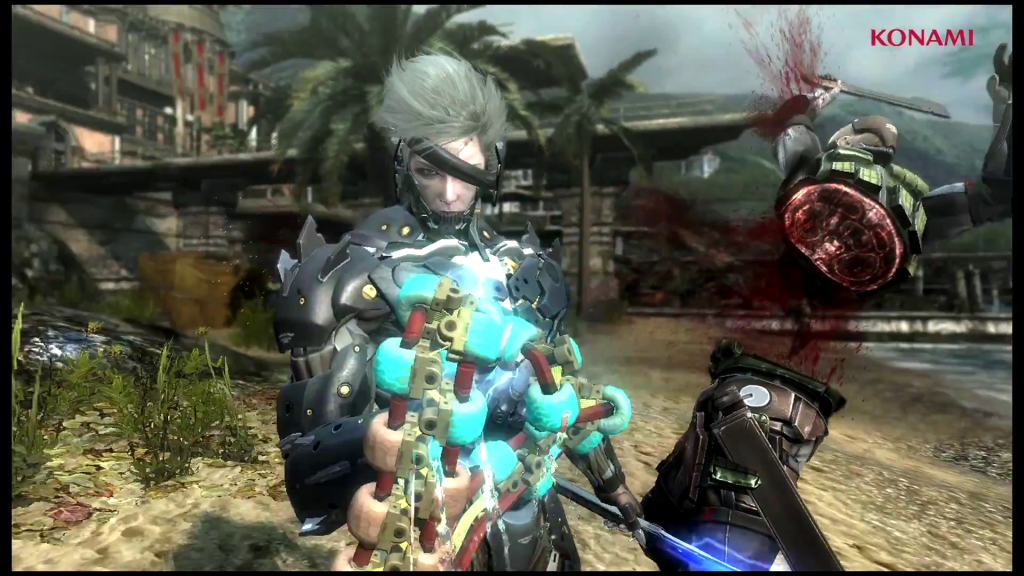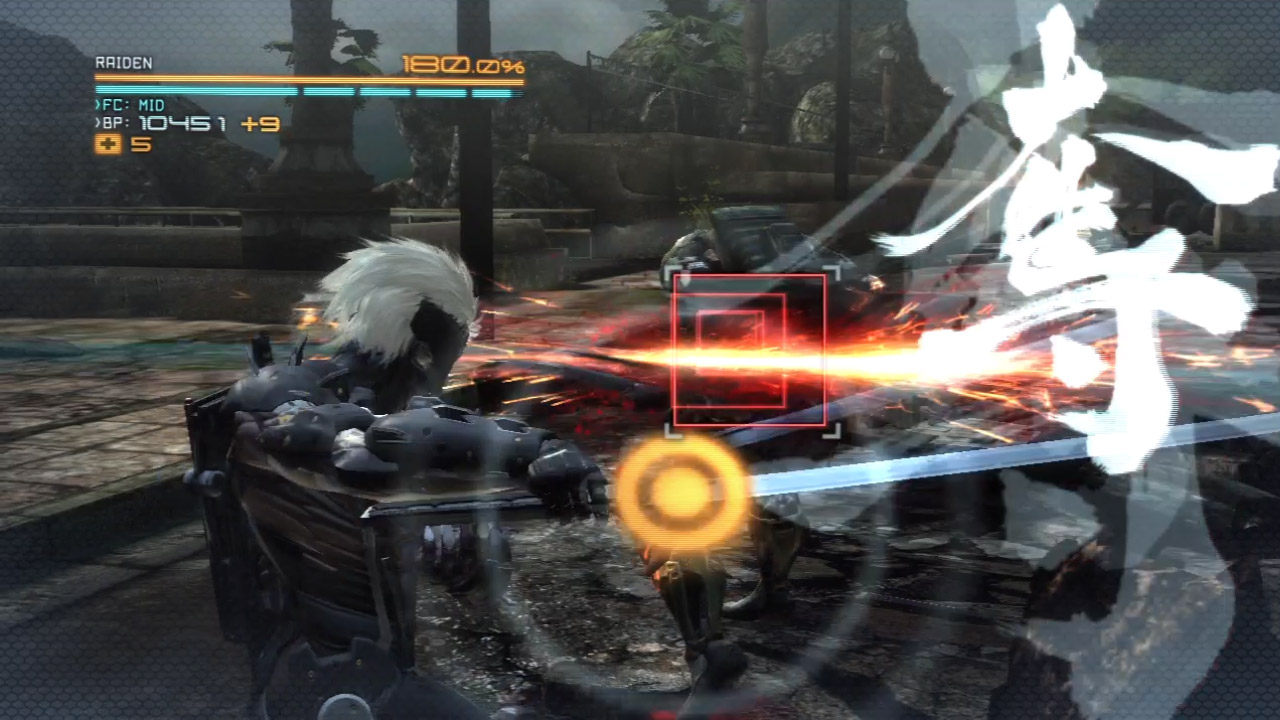I’m standing on a beach, looking at
the waves roll over each other, endlessly pushing onto the shore and
falling back into the ocean.
I, for obvious reasons, cannot feel the water on my feet, nor the breeze as it blows over the top of the infinite blue and licks against my cool, porcelain skin.
I can hear a man approach me from behind though, while I am lost in thought.
He swings his machete at my back, fully intending to jerk me away from thinking of the sea breeze or the sun beginning to set over the horizon. He expected to catch me unaware, but the second I see the red of his eyes out of the corner of my vision I have already begun to attack.
My sword passes through his ribs first, cutting deep into his heart and out the other side, splitting him in half.
For a second, I feel something, or to put it in layman’s terms - I imagine the character I am playing as feels something. There is a deep stirring in my chest
when the blood spatter hits the screen, the character of “ZANDATSU” displayed over it (it’s Japanese for Cut-and-Take.”
I, for obvious reasons, cannot feel the water on my feet, nor the breeze as it blows over the top of the infinite blue and licks against my cool, porcelain skin.
I can hear a man approach me from behind though, while I am lost in thought.
He swings his machete at my back, fully intending to jerk me away from thinking of the sea breeze or the sun beginning to set over the horizon. He expected to catch me unaware, but the second I see the red of his eyes out of the corner of my vision I have already begun to attack.
My sword passes through his ribs first, cutting deep into his heart and out the other side, splitting him in half.
For a second, I feel something, or to put it in layman’s terms - I imagine the character I am playing as feels something. There is a deep stirring in my chest
when the blood spatter hits the screen, the character of “ZANDATSU” displayed over it (it’s Japanese for Cut-and-Take.”

If we’re to speak of digital experiences, I’ve never seen the ocean before in real life.
Because of that, I’ve never quite understood the fascination with the ocean. You get told at a young age that it is impossible vast, yet at the same time it is succinct enough that it can be summed up in a photograph.
For that reason, looking at the ocean in a videogame fails to excite me. I know what I am looking at is a clever facsimile of the real thing, stripped of the sound, the smell, the touch.
When blood hits the screen in Metal Gear Rising, I have a stirring in my chest and I considered briefly upon playing it that perhaps it is the same thing someone feels when they look at a picture of the ocean after having seen it. I jerk back away from the screen, dropping my guard for a brief second. Another soldier takes advantage of this, I watch Raiden reel in much the same way I did and my life bar decrease.
Frustration gets the better of me and I unleash a torrent of slices into the enemy that attacked me, finishing by literally disarming him. Videogames have made be believe I may have more familiarity with ending a life than I do with looking at something beautiful, I know this is wrong.
In Metal Gear Rising, the core mechanic
is that Raiden (the protagonist) can enter a kind of trance mode
where time slows down. During this, the player has full control over
the angle of his sword and many objects, especially enemies, can be
bisected from just about any angle.
Metal Gear Rising was the real Surgeon Simulator released in 2013.
Second more important to that is that in the story of Metal Gear Rising, Raiden (the protagonist) goes off the deep end about half way through the story, entering a kind of bloodlust, berserker rage mode where he calls himself Jack The Ripper. Metal Gear Rising’s storyline, if you can’t tell, is pretty ludicrous; yet, there’s a type of story-gameplay cohesion that is out of this world compared to other action games released in the last two years.
Metal Gear Rising was the real Surgeon Simulator released in 2013.
Second more important to that is that in the story of Metal Gear Rising, Raiden (the protagonist) goes off the deep end about half way through the story, entering a kind of bloodlust, berserker rage mode where he calls himself Jack The Ripper. Metal Gear Rising’s storyline, if you can’t tell, is pretty ludicrous; yet, there’s a type of story-gameplay cohesion that is out of this world compared to other action games released in the last two years.
Metal Gear Rising, aside from
the mechanics sort of borrowed from Devil May Cry (which form
the basis for just about every modern action game) also borrows its
sense of style.
Whereas Devil May Cry enforces you to be stylish, Metal Gear Rising doesn’t care.
Metal Gear Rising wants you to be Jack The Ripper.
It is an emotional game, not because of the story it tells, but because when it frustrates you, it causes you to react violently.
I never feel Violent when I play Metal Gear Rising. I might get tense, or nervous as I watch myself get bodied completely free by Texas Senator but I never get violent.
I imagine Raiden doesn’t either.
Whereas Devil May Cry enforces you to be stylish, Metal Gear Rising doesn’t care.
Metal Gear Rising wants you to be Jack The Ripper.
It is an emotional game, not because of the story it tells, but because when it frustrates you, it causes you to react violently.
I never feel Violent when I play Metal Gear Rising. I might get tense, or nervous as I watch myself get bodied completely free by Texas Senator but I never get violent.
I imagine Raiden doesn’t either.
I’m somewhere on top of a building in
Texas, now. It’s a city I’ve never been in, impossibly grand and
large, yet I can feel neither the hot concrete on the bottom of my
feet, the mist from the fountain I walked by earlier on my skin or
the heat of the sun baring down on me.
Raiden and I are both waiting for the three soldiers in front of us to do something. It’s part of a learning experience, we both want to learn the timing of attacks necessary to correctly parry an oncoming assault, so he stands there while I idle my thumb on the joystick.
There’s that familiar red glint of the soldier’s eye.
“Yes.” I tell myself. “Let me show you how it’s done.” Raiden springs to life, carrying his sword in front of him. A smattering of sparks appears on stage, there is a loud clang of steel against steel.
I split the soldier down the front of the head with my sword, carrying on to the one beside him.
Many games have graphic displays of violence in them, from the gore and mutilation present on bodies in Resident Evil to the corpses and bullet holes in Counter-Strike. Rising is different, because unlike those games I am the perpetrator of violence directly. I can equally choose to watch a lifeless ragdoll hit the ground and disappear as I can to watch the two halves of a man hit the ground.
The sense of accomplishment is not in watching a Style meter rise from Awesome to Stylish, it’s in knowing that I did that.
Raiden and I are both waiting for the three soldiers in front of us to do something. It’s part of a learning experience, we both want to learn the timing of attacks necessary to correctly parry an oncoming assault, so he stands there while I idle my thumb on the joystick.
There’s that familiar red glint of the soldier’s eye.
“Yes.” I tell myself. “Let me show you how it’s done.” Raiden springs to life, carrying his sword in front of him. A smattering of sparks appears on stage, there is a loud clang of steel against steel.
I split the soldier down the front of the head with my sword, carrying on to the one beside him.
Many games have graphic displays of violence in them, from the gore and mutilation present on bodies in Resident Evil to the corpses and bullet holes in Counter-Strike. Rising is different, because unlike those games I am the perpetrator of violence directly. I can equally choose to watch a lifeless ragdoll hit the ground and disappear as I can to watch the two halves of a man hit the ground.
The sense of accomplishment is not in watching a Style meter rise from Awesome to Stylish, it’s in knowing that I did that.
I’m standing in a dry field in the middle of nowhere. The dust rolling off of the road is fresh, like someone just drove through. This is a place that’s familiar to me. I may not have ever stood on top of a skyscraper in the middle of a cluttered metropolitan city, or stood on a beach with the sand between my toes, but this is familiar. I can’t count how many times I’ve been here before, barefoot in the back of my parent’s yard in the middle of summer, or standing on a trail somewhere with a stick from the side of the road propping me up under the hot desert sun.
There’s a warm breeze pushing at my back, reminding me to look forward to the next kill.
The distant hum of a motorcycle engine approaching tears the peacefulness of the old country road apart. I grip the handle of my sword, worried the sweat running off of my arm and into my palm might make me lose my grip.
This is no less make believe than standing on that road as a little kid, swinging a stick around.
-skeletons




No comments:
Post a Comment